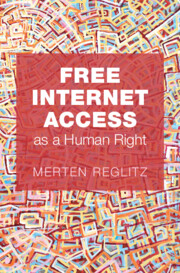Book contents
- Free Internet Access as a Human Right
- Free Internet Access as a Human Right
- Copyright page
- Dedication
- Contents
- Acknowledgements
- Introduction
- Part I Justifications
- Part II Obligations
- 5 Poverty as a Standard Threat
- 6 States as Standard Threats
- 7 Private Companies as Standard Threats
- 8 Other Internet Users as Standard Threats
- Conclusion
- Bibliography
- Index
8 - Other Internet Users as Standard Threats
from Part II - Obligations
Published online by Cambridge University Press: 15 November 2024
- Free Internet Access as a Human Right
- Free Internet Access as a Human Right
- Copyright page
- Dedication
- Contents
- Acknowledgements
- Introduction
- Part I Justifications
- Part II Obligations
- 5 Poverty as a Standard Threat
- 6 States as Standard Threats
- 7 Private Companies as Standard Threats
- 8 Other Internet Users as Standard Threats
- Conclusion
- Bibliography
- Index
Summary
The online sphere is a relatively new space and as such is much less regulated and policed than the offline world. This also means that rights are less protected online than they are in the physical world. Online harassment, hate speech, and misinformation via echo chambers, filter bubbles, conspiracy theories, and fake news have received increasing attention. Free internet access requires that users are reasonably protected by public authorities from such rights violations. The chapter looks at this problem from the perspective of three necessary elements required for the enjoyment of all rights: (1) rights enforcement, (2) an environment conducive to rights, and (3) education and skills training. In terms of enforcement, public authorities face the problem of having to identify often anonymous individual offenders without undermining general internet user anonymity. With respect to a safe environment, the chapter focuses on political polarisation and to what extent online misinformation is responsible for it. Finally, the chapter sets out certain skills that states ought to teach their citizens so they are able to defend themselves against attacks by other internet users.
Keywords
- Type
- Chapter
- Information
- Free Internet Access as a Human Right , pp. 278 - 321Publisher: Cambridge University PressPrint publication year: 2024

